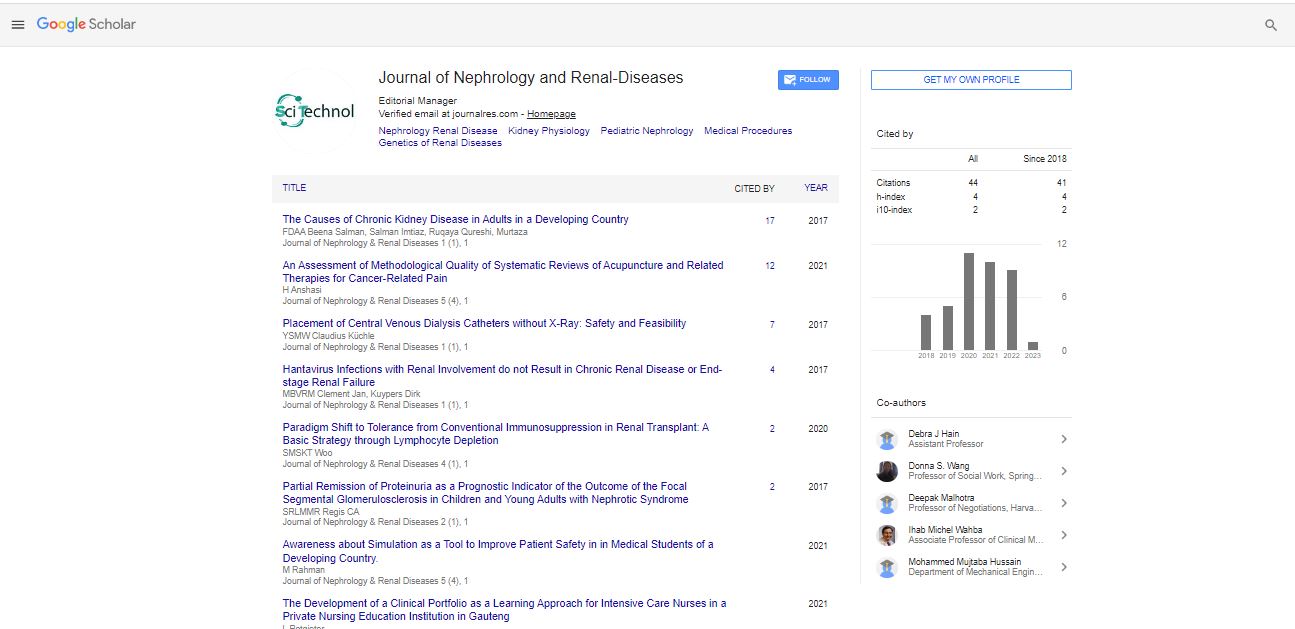Opinion Article, J Nephrol Ren Dis Vol: 7 Issue: 4
Unveiling Diuretics: A Comprehensive Exploration of a Vital Drug Class
Liang Ashley*
1Department of Medicine, University of Minnesota Medical School, Minneapolis, United States of America
*Corresponding Author: Liang Ashley,
Department of Medicine, University of
Minnesota Medical School, Minneapolis, United States of America
E-mail: liangashley1044@umn.edu
Received date: 01 November, 2023, Manuscript No. JNRD-23-123896;
Editor assigned date: 03 November, 2023, PreQC No. JNRD-23-123896 (PQ);
Reviewed date: 20 November, 2023, QC No. JNRD-23-123896;
Revised date: 27 November, 2023, Manuscript No. JNRD-23-123896 (R);
Published date: 04 December, 2023, DOI: 10.4172/2576-3962.1000046
Citation: Ashley L (2023) Unveiling Diuretics: A Comprehensive Exploration of a Vital Drug Class. J Nephrol Ren Dis 7:4.
Abstract
Diuretics, commonly known as water pills, constitute a crucial class of medications widely prescribed to manage conditions related to fluid retention and high blood pressure. These drugs play a pivotal role in regulating the balance of water and electrolytes in the body, impacting kidney function to promote the excretion of excess fluids.
Description
Diuretics, commonly known as water pills, constitute a crucial class of medications widely prescribed to manage conditions related to fluid retention and high blood pressure. These drugs play a pivotal role in regulating the balance of water and electrolytes in the body, impacting kidney function to promote the excretion of excess fluids. This article explained the diverse world of diuretics, exploring their mechanisms of action, different types, medical applications, and potential side effects.
Mechanisms of action
Diuretics function by altering the renal handling of sodium and water, leading to increased urine production and subsequent elimination of excess fluids. The three primary types of diuretics, each acting at distinct sites in the kidneys, are thiazide diuretics, loop diuretics, and potassium-sparing diuretics.
Thiazide diuretics: Thiazide diuretics, such as hydrochlorothiazide, act on the distal convoluted tubules of the kidneys. They inhibit sodium reabsorption, promoting the excretion of sodium and water. Thiazides are commonly prescribed for managing hypertension and edema associated with heart failure.
Loop diuretics: Loop diuretics, exemplified by furosemide and bumetanide, target the ascending loop of Henle in the kidneys. By inhibiting sodium and chloride reabsorption, loop diuretics induce a potent diuretic effect. This class is often employed for addressing severe edema, as well as conditions like congestive heart failure and certain kidney disorders.
Potassium-sparing diuretics: Potassium-sparing diuretics, including spironolactone and amiloride, exert their effects in the collecting ducts of the kidneys. Unlike thiazide and loop diuretics, potassium-sparing diuretics limit potassium excretion, making them suitable for patients prone to potassium depletion. They are commonly used as adjuncts in the management of hypertension and heart failure.
Medical applications
Diuretics are a cornerstone in the treatment of hypertension. By promoting the elimination of excess sodium and water, diuretics reduce blood volume and help lower blood pressure. Thiazide diuretics, in particular, are often prescribed as first-line agents for hypertension management. The abnormal accumulation of fluid in tissues, is a common indication for diuretic therapy. Loop diuretics are frequently employed in cases of severe edema associated with conditions like heart failure, liver cirrhosis, and renal disorders. Diuretics play a crucial role in managing heart failure by alleviating fluid overload. They help reduce the workload on the heart by decreasing fluid retention, relieving symptoms such as dyspnea and swelling. Kidney Disorders: Certain kidney disorders, such as nephrotic syndrome and acute kidney injury, may benefit from diuretic therapy. Diuretics can help manage fluid imbalances and mitigate complications associated with impaired renal function. Potassiumsparing diuretics, particularly aldosterone antagonists like spironolactone, are employed in conditions of hyperaldosteronism. These drugs help counteract the effects of excess aldosterone, which can contribute to hypertension and electrolyte imbalances.
Potential side effects
While diuretics are generally well-tolerated and effective, they can be associated with certain side effects that necessitate careful monitoring and management.
• Electrolyte Imbalances
• Dehydration
• Hypotension
• Renal Impairment
• Gout Attacks
• Ototoxicity
Conclusion
Diuretics, encompassing thiazide, loop, and potassium-sparing varieties, constitute a vital class of medications in the management of various medical conditions. Their mechanisms of action involve modifying sodium and water reabsorption in the kidneys, thereby influencing fluid balance throughout the body. Diuretics play a central role in treating hypertension, edema, heart failure, and certain kidney disorders, contributing significantly to improved patient outcomes. Despite their efficacy, it is imperative to monitor for potential side effects, particularly electrolyte imbalances and dehydration. Regular follow-up with healthcare providers ensures appropriate adjustments to dosage and intervention if adverse effects occur. In conclusion, the judicious use of diuretics, guided by a thorough understanding of their mechanisms and potential side effects, remains essential in optimizing patient care and addressing fluid-related disorders.
 Spanish
Spanish  Chinese
Chinese  Russian
Russian  German
German  French
French  Japanese
Japanese  Portuguese
Portuguese  Hindi
Hindi 
